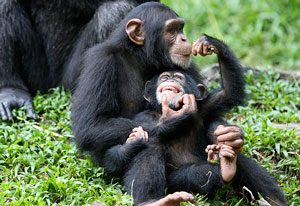The land has gone months without a good rain, and the rich, sweet smell of soil and vegetation fills the air. It didn’t pour last night, but it rained steadily for some hours, and was still raining at dawn.
Three slender trees intersect over the creek above my head. I sit beside a section of the stream so smooth that every sycamore and oak branch on the other side is reflected off the water.
Human beavers have been at work here over the summer, laying a substantial rock wall from one side of the creek to the other. The stream now has about a third more volume, and the water flowing down from the mountains cascades over the stones, giving the spot an intimation of wildness.
Jane Goodall, longtime observer and friend of chimpanzees at Gombe Reserve in Tanzania, said recently that like humans, chimps “have a dark, brutal side to their nature.”
Swing over to Alan Greenspan, the guru of the global financial system during the Clinton and Bush Administrations, and the goat of its collapse since. He made one of his characteristically surface-clear/profoundly opaque comments recently. “Unless somebody can find a way to change human nature, we will have more crises.”
We call it ‘human nature,’ but it isn’t actually nature, just a big wrinkle in evolution that all self-aware species in whom symbolic thought evolves must sort out. Of course, ‘sorting it out’ isn’t the way to clarity, since it means using the same mechanism that got us into this mess in the first place.
Chimps can’t invent technology or devise plans as well as humans can, nor can they concoct belief systems and accrete cultural traditions to the degree we can. ‘Planet of the Apes’ notwithstanding, perhaps they could take our place in another million or two years if we wiped ourselves out. But then, they would be faced with the same spiritual and philosophical dilemma, along with the increasing imperative to change ‘chimp nature.’
The fashionable practice of blurring the line between chimps and humans, as Jane Goodall, one of the leading proponents of this philosophical stance does, throws no light on the quandary.

It’s not enough to say, as Goodall does, “chimpanzees show far more frequently the tendencies of compassion, empathy, and love than violence and brutality.”
A fresh approach to the old problem of nature or nurture is necessary. The fundamental question, it seems to me, is: What is the difference between conditioning in humans, and conditioning in chimps and our other primate cousins?
What we call human nature is a discordant mixture of instinct and conditioning (or, to use the more popular term, ‘socialization’).
After saying that “chimpanzees teach us that we’re part of the animal kingdom,” Goodall was asked, what is the essential difference between animals and humans? “Animals by and large are not destroying their environments, although some of them would if they could.” That sounds like classic anthropomorphizing.
Nonetheless, Goodall asked the central question: “How is this most intellectual of species that’s ever walked the planet, how is it that we’re destroying our only home?”
Her answer just begs the question. “It’s because of the disconnect between the clever brain and the seat of love and compassion, the human heart,” Goodall says. OK, but how did that disconnect originate, and what heals it?
Chimpanzees, with their occasional wars and genocides, are the best evidence on this planet, other than humans, that the evolution of ‘higher thought’ carries with it profoundly divisive and destructive tendencies.
To grow beyond the level of brainy chimps, we have to understand (through questioning and insight), and negate (through passive observation and insight), the movement of thought. That action is what puts thought in its rightful place.
Whether the transmutation from humans to human beings happens in the foreseeable future or in the unforeseeable future, one has to have faith that it will happen, because it must. Not just to end the inane cycles of boom and bust, not to mention humankind’s destruction of the earth, and itself; but firstly, to realize our spiritual potential as sentient beings.
There is another dimension of being, as far beyond where we are as humans now as chimpanzees are from us. That’s a leap, but it really isn’t that far.
Martin LeFevre
